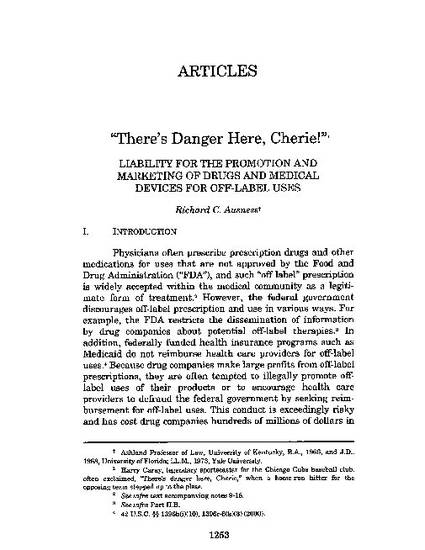
Physicians often prescribe prescription drugs and other medications for uses that are not approved by the Food and Drug Administration ("FDA"), and such "off label" prescription is widely accepted within the medical community as a legitimate form of treatment. However, the federal government discourages off-label prescription and use in various ways. For example, the FDA restricts the dissemination of information by drug companies about potential off-label therapies. In addition, federally funded health insurance programs such as Medicaid do not reimburse health care providers for off-label uses. Because drug companies make large profits from off-label prescriptions, they are often tempted to illegally promote off-label uses of their products or to encourage health care providers to defraud the federal government by seeking reimbursement for off-label uses. This conduct is exceedingly risky and has cost drug companies hundreds of millions of dollars in fines and civil penalties. Moreover, the current federal policy with respect to off-label use not only threatens the pocketbooks of drug companies, but also adversely affects public health by discouraging drug companies from publicizing promising off-label therapies. A revision of the current policy is urgently needed.
This Article concludes that the current FDA policy should be revised because it encourages criminal behavior on the part of pharmaceutical companies and deprives physicians of potentially useful information about new and useful treatments. Part II examines the FDA's drug and medical device approval processes, as well as its regulation of the promotion of off-label uses under the Food and Drug Modernization Act and various "guidance" documents issued pursuant to this legislation. Part II also describes some of the criminal and civil penalties that can be imposed for violating the FDA's restrictions on the marketing of off-label uses. Part III discusses potential liability under the Racketeer Influenced and Corrupt Organizations Act ("RICO"), with particular attention to two recent cases, Hamm v. Rhone-Poulenc Rorer Pharmaceuticals, Inc. and In re Neurontin Marketing, Sales Practices, and Products Liability Litigation. Part III will also discuss the liability of drug companies under the False Claims Act for directly and indirectly obtaining compensation from the federal government for the sale of products for off-label uses. Tort liability is the focus of Part IV. This includes tort claims based on violations of the Food, Drug and Cosmetic Act, fraudulent misrepresentation, failure to warn about the risks of particular off-label uses, and failure to test for risks associated with off-label label uses. Finally, Part V evaluates the FDA's current policy concerning the promotion of off-label uses and concludes that it is too restrictive.

Brooklyn Law Review, Vol. 73, No. 4 (Summer 2008), pp. 1253-1326